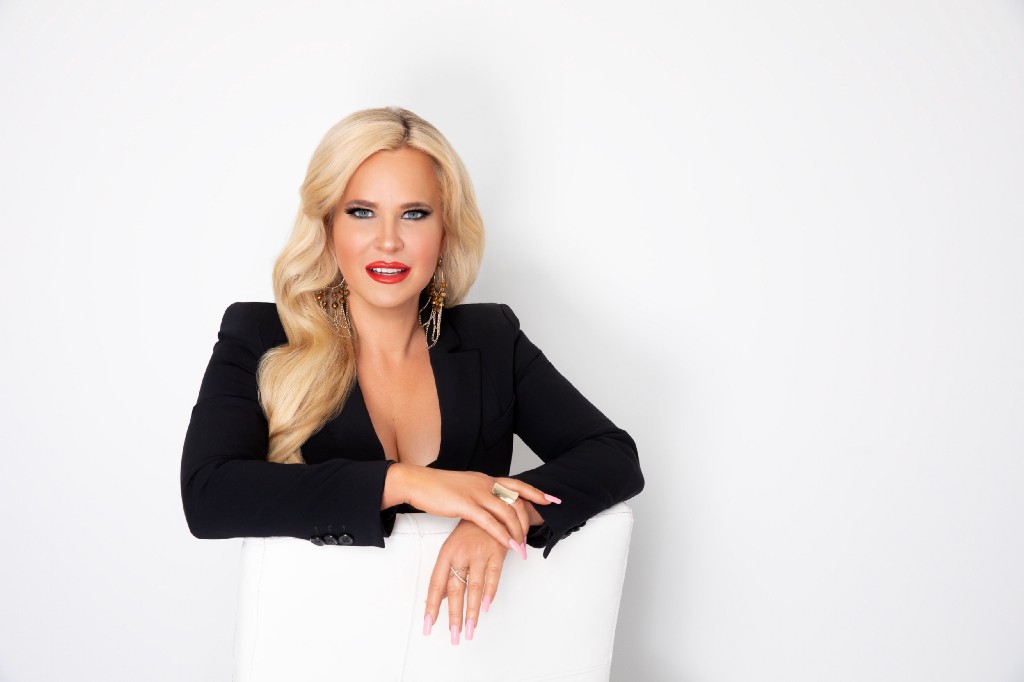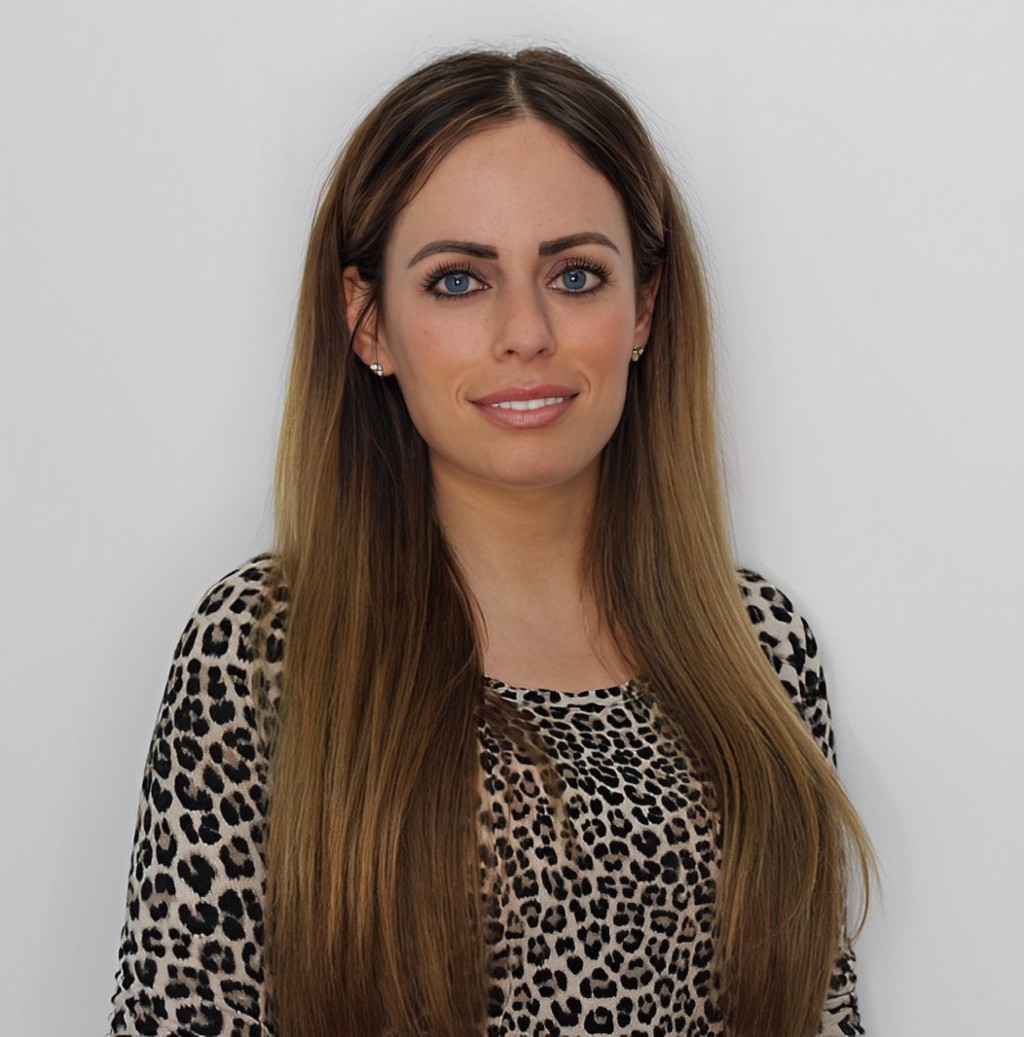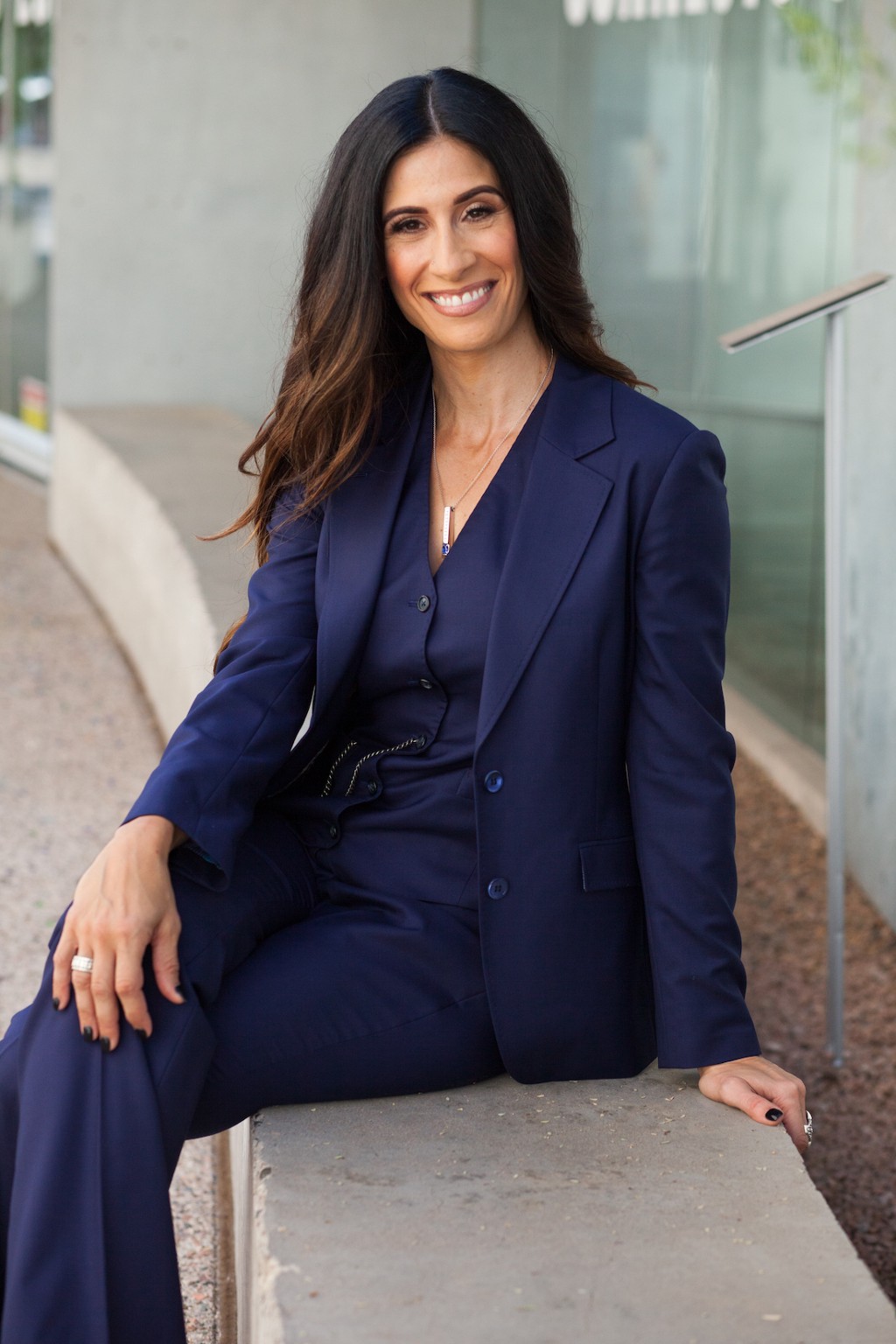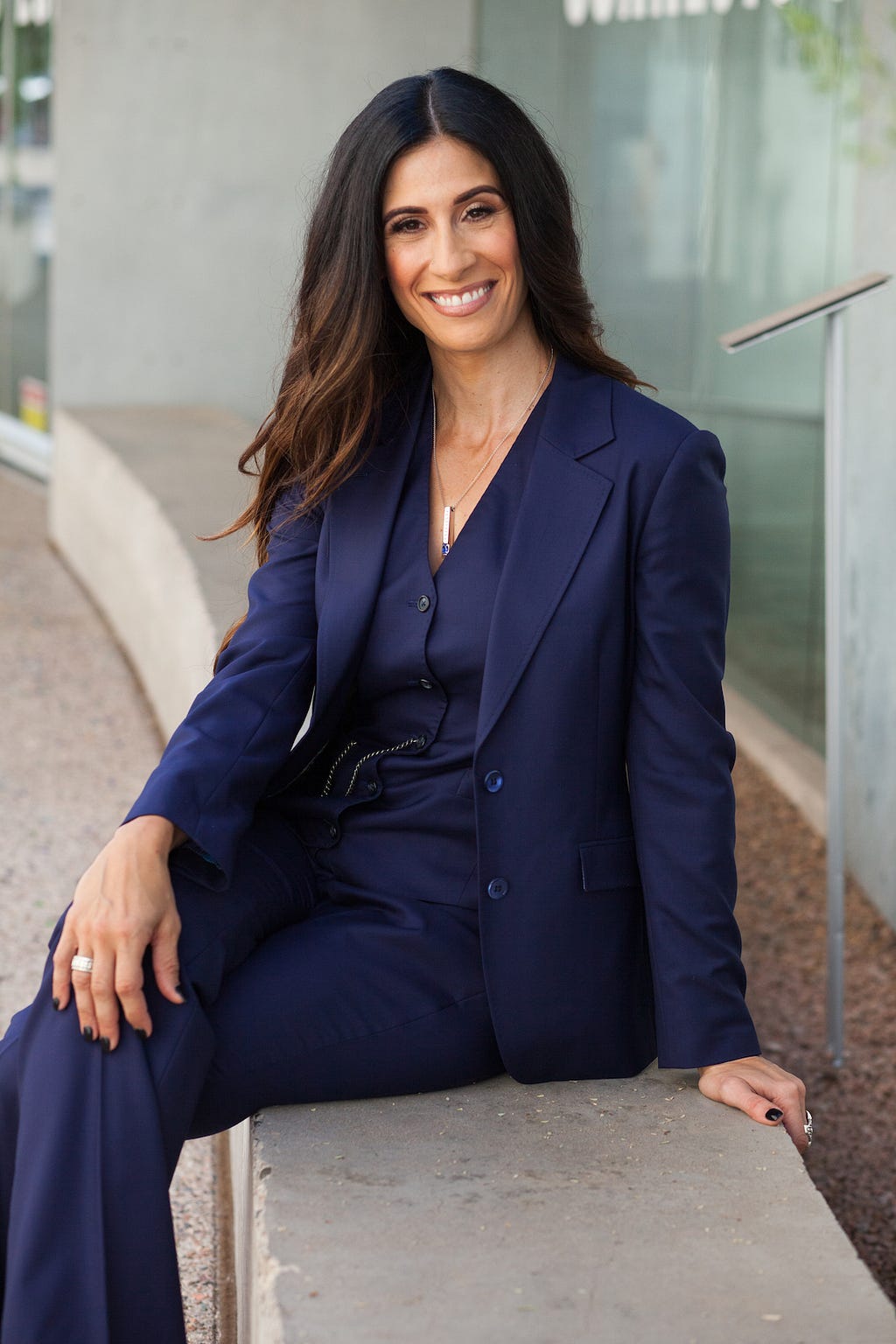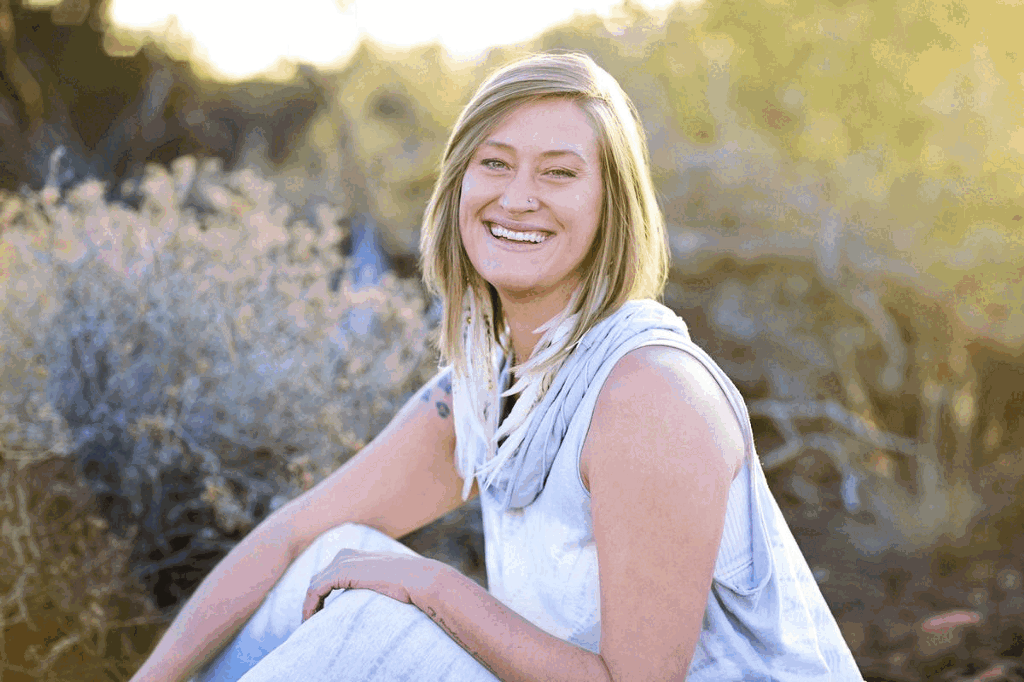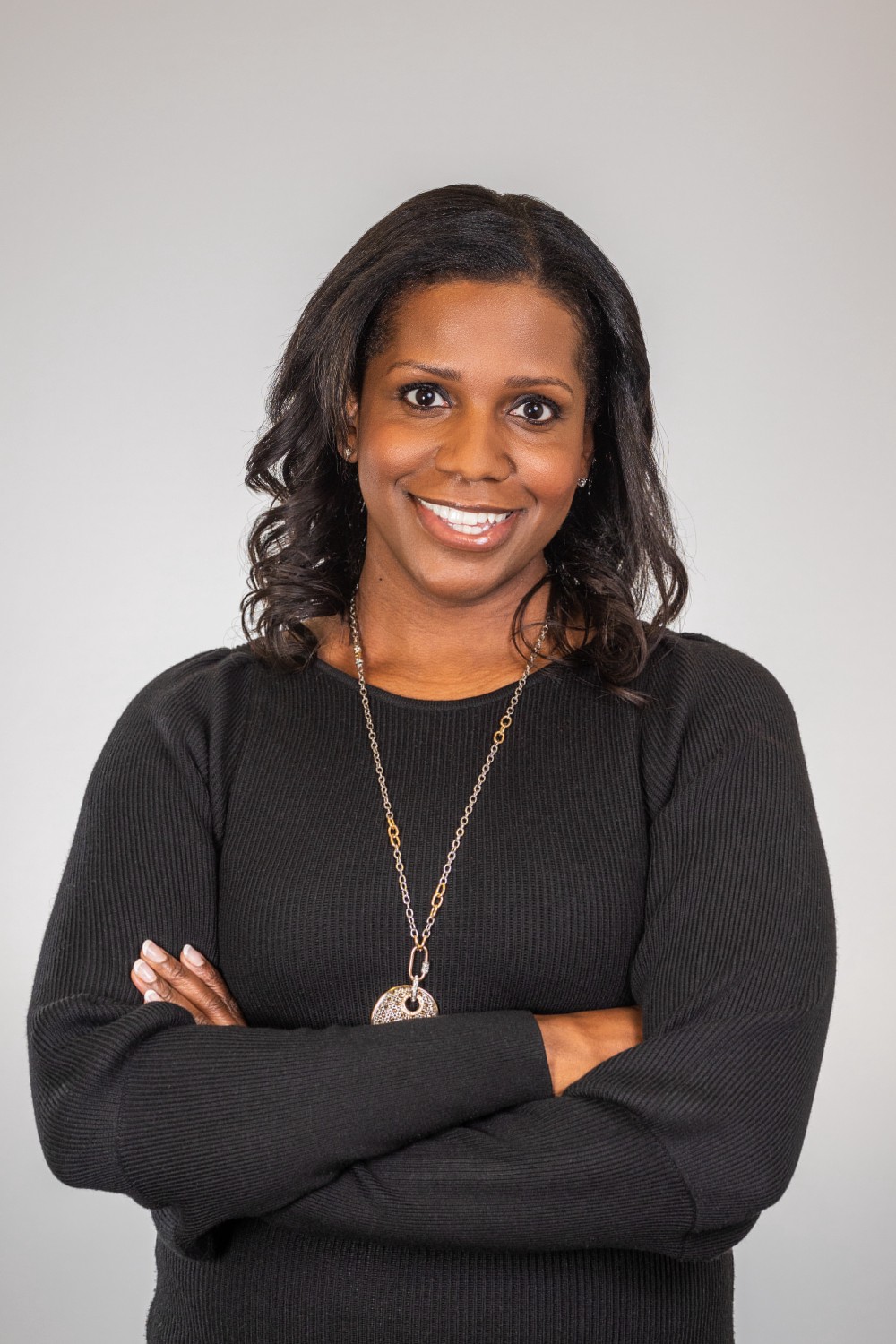Female Disruptors: Andréa Albright of Beverly Hills Publishing On The Three Things You Need To Shake Up Your Industry
An Interview With Candice Georgiadis

Number one, authenticity. Authenticity is about knowing yourself. Being true to yourself, aligning yourself with your inner core, your inner values, your inner strengths. The more you know yourself, the less confused you will be by other people’s changes of opinions, or you won’t be influenced as easily. You will also be the most powerful person in any room because your alignment with your truth and your knowingness of who you are is the most attractive and powerful force that other people will gravitate towards. So, authenticity is a keyword to not only align for your own self, but also to attract others because everyone can tell when you are genuinely aligned with your inner truth.
As a part of our series about women who are shaking things up in their industry,I had the pleasure of interviewing Andréa Albright.
Andréa Albright is known as a global media disruptor. She is the founder and CEO of Beverly Hills Publishing, which is disrupting the 100 billion dollar publishing industry by being the first marketing firm, publishing firm, PR firm, and Hollywood distribution in one. Her passion to protect authors’ stories, across all forms of media, is unique to publishing and makes the greatest impact to build the author’s authority brand.
Thank you so much for doing this with us! Before we dig in, our readers would like to get to know you a bit more. Can you tell us a bit about your “backstory”? What led you to this particular career path?
My passion for books started when I was very young and books were my first mentors. Before I ever knew anyone who was wealthy or successful, I learned from books. I became an author in 2006, and I remember being so terrified to release my first book because I thought that I would be judged and I would sound stupid and it wouldn’t go anywhere. But I was able to overcome my fear and insecurities by focusing on the reality that if I could help just one person, isn’t it worth it? When I released my book, that immediately changed my life because people started giving me respect and credibility. I would receive emails from people all over the world telling me how my book had not just changed their life, but in some cases saved their life.
I built a global authority brand in one of the most competitive industries in the world by publishing books, creating marketing campaigns, and aligning my message to get publicity and PR. I realized that all the other publishers were not serving their authors and helping them get the marketing and the promotion after their book was published. Due to this, I had an opportunity to disrupt the publishing industry and serve authors at the highest level. My passion for books, marketing, and making a difference in the world has now all aligned with Beverly Hills Publishing, being an innovator in the publishing industry.
Can you tell our readers what it is about the work you’re doing that’s disruptive?
The old-fashioned way of publishing books is not only ineffective, but it’s broken. According to statistics, over a million books are published every year, but less than 1% of those books make an impact in their market. That is a horrible statistic. The rate of failure means that the publishing industry is not serving their authors.
My approach is disruptive because I think about the impact of the book before we ever start writing it. That means that I do the full marketing analysis, marketing strategy, and also branding positioning of the author’s message before we write and publish the book. What this does is it aligns the author’s message with what the audience is seeking and searching for. Therefore, when we publish the book, in as little as 90 days, there is already an audience who wants to buy it. This creates a greater impact for the author to touch the lives of the audience. Additionally, we get press and publicity that is eager to interview the author about their unique approach and their unique solution. This marketing first strategy not only sells more books and makes a greater impact on the audience, but it also builds the author’s brand and establishes them as one of the top authorities in their industry.
Can you share a story about the funniest mistake you made when you were first starting? Can you tell us what lesson you learned from that?
When I first became a publisher, I was publishing my own books and all of my books were digital. I was invited to speak on TV, and it was my first live television appearance so they asked me to bring in a copy of my book so that I could present it on television and I can have it with me when I was on TV. This was a large news organization; it was at Fox News. I remember thinking, “Oh my gosh, how am I going to come up with a book?”
Since it was a digital book, I just went and had it printed at Kinko’s, and that was the first time I had printed a book because I had always sold my books electronically and digitally. I laugh about that today because as a publisher, we print all copies and all variations of publishing digitally as well as soft back and hard back. I can’t even imagine showing up to an event, or a TV appearance, without a perfectly published book. But looking back, the very first official printing of any of my books was me rushing to Kinko’s to get my book printed so I could be on TV.
I think the lesson from this is when you’re presenting yourself on the world stage as an authority, you always want to be prepared. You always want to have everything at the highest level, and you don’t want to have to ever present your brand in a rushed or less than highest quality way.
We all need a little help along the journey. Who have been some of your mentors? Can you share a story about how they made an impact?
I wouldn’t be who I am without my mentors. I am so grateful for the first mentor I had who taught me how to write and publish a book. He transformed my life forever. Recently, I have a new mentor who’s been with me for over four years and his name is Satyen Raja. He has helped me in more ways than I can ever explain. The greatest impact he has had on my life is that before I met him, I was addicted to struggle. I used to think that if I was struggling, then that made me strong, or it somehow validated my success. The problem with that is if you identify with struggle and that you have to make things hard in order to feel strong because you’ve overcome them, then you will continue to create patterns and situations of struggle.
Now that I have removed the elements of struggle, I find that I am creating more success faster and easier with less effort. This identification where one has to work hard in order to prove your value is one of the hardest things to let go of in our society. But once you let go of it, then you can truly be free to just create your highest vision. I have to thank my mentor for showing me that path to ultimate freedom without struggle.
In today’s parlance, being disruptive is usually a positive adjective. But is disrupting always good? When do we say the converse, that a system or structure has ‘withstood the test of time’? Can you articulate to our readers when disrupting an industry is positive, and when disrupting an industry is ‘not so positive’? Can you share some examples of what you mean?
I think of disruption as evolution. Disruption doesn’t mean that you blow everything up and you start over again. Disruption is about letting go of the status quo because the status quo is what keeps people and an industry stuck. So, disruption is both positive and negative, but it’s essential for evolution. While you are going through a disruption, it’s hard because the things that used to work are no longer working. People resist change because they are out of their comfort zone and they have to relearn ways to even feel like they have safety and security. But disruption, when you embrace it, you actually realize that the only thing that is inevitable is change. So disruption as far as evolving is positive. You cannot get attached to the past because if you’re not changing, you’re not growing. If society and culture isn’t changing, then there’s no evolution. An example of creating things that last the test of time, I like to think of the foundation of health and yoga. There are fundamentals to human biology that we have to have in order to be healthy.
In the 1950s, all of the experiments with frozen foods and adding chemicals, additives, and preservatives; that was a disruption. It turned out to be a failed science experiment, because ever since the 1950s, the rates of obesity and depression, anxiety, and diseases like cancer, diabetes, and heart disease have skyrocketed. We can trace them back to the beginnings of when humans started altering their food and putting these chemicals in them. In turn, that would be an example of a disruption that was not positive. We need to go back to the fundamentals of new nutrition and food and health as a baseline for our society. Disruption is about evolution, but if it’s disrupting and causing a negative result, then that is not a disruption we want.

Can you share 3 of the best words of advice you’ve gotten along your journey? Please give a story or example for each.
Number one, authenticity. Authenticity is about knowing yourself. Being true to yourself, aligning yourself with your inner core, your inner values, your inner strengths. The more you know yourself, the less confused you will be by other people’s changes of opinions, or you won’t be influenced as easily. You will also be the most powerful person in any room because your alignment with your truth and your knowingness of who you are is the most attractive and powerful force that other people will gravitate towards. So, authenticity is a keyword to not only align for your own self, but also to attract others because everyone can tell when you are genuinely aligned with your inner truth.
The second word I would say is vision. Vision is your ability to see into the future and then to work backwards from what you want to create. The more clearly you are aligned with your vision, the easier it is to create your authentic truth. You are also not going to be swayed by the ups and the downs of the status quo or the current situation. When you see the vision of where you’re going and what you’re creating, then you’re able to align with your purpose, your mission, your values, and it’s your north star that pulls you in the direction of moving forward. So even as society or your family or your industry may be changing or collapsing around you, you can see the potential for possibility. We need more visionaries, because visionaries are the ones who are able to see into the future and find solutions for humanity to evolve.
Third word I would use is service. To be of service is the greatest gift you can ever receive in a lifetime. It’s interesting because most people think of service as giving to others, and that is exactly what it’s about, but it’s also the greatest joy you will ever receive. Knowing that your life makes a difference. Knowing that you have impacted others in a positive way is the greatest wealth. I know people who have made a lot of money, who have a lot of power or status, but if they don’t have that sense of fulfillment, of knowing that their life matters and has made a positive difference in others’ lives, then there’s an emptiness inside of them. Being of service is an incredible way to align your dreams and goals because you know that you are contributing to others. It takes you out of your own myopic view of saying I only am here to achieve success for myself. You actually expand to see other people’s perspectives, and then you also get the deepest fulfillment of soul satisfaction.
We are sure you aren’t done. How are you going to shake things up next?
Well, I’m just getting started. They call me the media disruptor because I see the media as the greatest influential factor of a person’s life. The music they listen to, the books they read, the TV shows they watch, the Instagram channels they subscribe to. This all becomes a person’s day to day experience and their reality. I say the media is like the water to a fish. So, a fish is swimming in the water all day every day, and they’re not even on it. Well, that is what media is to an individual human. Since it is so important, my commitment is to raise the vibration of the media. To have the media being a broadcast channel of positivity, health, abundance, hope, prosperity; everything that is worthwhile and valuable about human life. There’s so much negativity in the world. If someone doesn’t take responsibility and create a media empire that can balance all of this darkness, then humanity will go back into the dark ages of fear and superstition. As a publisher, as a media disruptor, I am committed to raising the vibration of the planet, by focusing on a positive message across all forms of media.
In your opinion, what are the biggest challenges faced by ‘women disruptors’ that aren’t typically faced by their male counterparts?
Women have different skills of intuition and higher levels of communication than most men. Due to this, we can be seen as overly reactional and too emotional and unfit for business. You walk into the room, as a woman, and you automatically meet those stereotypes. We have an opportunity to evolve business, to include these higher-level states of intuition and connection to other humans. Things that make being a woman valuable are actually needed now more than ever because society is changing. The world is changing. We are asking more from our leaders to be compassionate and understanding, while still focused on guiding profits and value and creating resources. Everything that business is about to drive the economy, to change lives, to build communities, provide education, and build health for families. None of that happens without business. I believe that the world is ready for an evolution where the old fundamental principles of business and the values of what business provide are now going to be integrated to include the values that women have to offer.
Do you have a book/podcast/talk that’s had a deep impact on your thinking? Can you share a story with us?
Oprah Winfrey has created a media empire through the television shows that she has launched and the podcast that she has. She has deep, meaningful conversations with world changers. Her perspective is so valuable, and it’s so essential because she’s using higher level skills, talents of communication, and new intuition to draw the same out of an individual and share with the world. We get to be inspired and we also are reminded that being smart is sexy and cool. I love how she is so passionate about books because as long as we continue to keep our minds open and continue to learn, then there is no problem we can’t solve. I believe Oprah Winfrey has been an incredible mentor for me, not just in the forms of how to build and run a media empire, but also the passion of education as the source of enlightenment and truth.
You are a person of great influence. If you could inspire a movement that would bring the most amount of good to the most amount of people, what would that be? You never know what your idea can trigger. 🙂
Education will be the root of enlightenment. Enlightenment is what keeps your mind open, what keeps you connected, what keeps you out of fear and loneliness and depression and superstition. I want young girls, instead of judging themselves on their appearance, I want them to start judging themselves on how much they learned today. I want that to be the new competition. Who learned the most today? Who has the most to share with others? Learning and teaching go hand in hand when you’re passionate about learning. You can’t help but want to teach and want to give back and guide others. I would like to create a revolution where women no longer compete on the size of their bodies or the appearance of their attractiveness. We are now competing on who learns the most every single day.
Can you please give us your favorite “Life Lesson Quote”? Can you share how that was relevant to you in your life?
I will be quoting Gandhi. I learned this message in my twenties, and it changed my life forever. He says, “my life is my message.” When you hear that phrase, “my life is my message,” it removes this myopic view of, “Oh, I have to achieve this amount or that, or I have to do X in order to get Y.” It expands to show that you’re never done, and it’s never over. That freed me from so much attachment to time and that I had to have it all figured out at a certain time or a certain age.
It expands responsibility because your life as your message will continue to evolve. It evolves you and the impact, the legacy that you are here to leave is about how you live your day-to-day life. I believe that if more leaders took this perspective on, they would be more responsible and have more integrity with their day-to-day actions. Instead of just looking at how they’re perceived in these grand gestures. That is a quote that I remind myself of often and frequently. Almost every day I ask myself, if this were your last day on earth, were you fulfilled? Did you give it your all? Did you make the greatest impact possible? I have to say, most of the time I say yes, but I’m also glad I’m not done, because I still have more to do.
How can our readers follow you online?
Our readers can follow me online at www.beverlyhillspublishing.com
This was very inspiring. Thank you so much for joining us!
Thank you for the opportunity.
Female Disruptors: Andréa Albright of Beverly Hills Publishing On The Three Things You Need To… was originally published in Authority Magazine on Medium, where people are continuing the conversation by highlighting and responding to this story.

